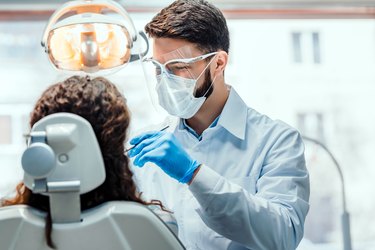
Bleeding gums might not seem like a big deal. But if you notice a red or pink tinge when you rinse after brushing or flossing, it's important to figure out what's causing the problem.
Bleeding gums are typically a sign of inflammation, explains Los Angeles-based cosmetic dentist Matt Asaro, DDS. That can cause discomfort in your mouth and increase the risk for tooth decay, but there are other risks as well. Inflamed gums are tied to a higher risk for serious health problems, including respiratory disease, diabetes, heart disease, stroke and rheumatoid arthritis, according to the Mayo Clinic.
Video of the Day
Video of the Day
Once you know what's causing your bleeding gums, you can take steps to solve the issue and improve the health of your mouth. Here are some of the most common culprits and what you can do to manage them.
What Causes Bleeding Gums?
"Poor oral hygiene is the most common cause of bleeding gums," Dr. Asaro says. Here's how that can cause your gums to bleed, plus other possible factors that could lead to bleeding.
1. You Have Gum Disease
Gingivitis is a mild form of gum disease that can cause redness, irritation and swelling. This can make your gums more sensitive and prone to bleeding when you brush or floss, Dr. Asaro explains.
Gingivitis is usually caused by poor oral hygiene (i.e. not brushing and flossing properly or often enough), and when left untreated, it can lead to serious gum infections and even tooth loss, per the Centers for Disease Control and Prevention (CDC).
2. You're Brushing Too Hard
Brushing too aggressively or using a very firm toothbrush might irritate your gums and make them more prone to bleeding, Dr. Asaro says. The problem may be more likely to occur if your gums are inflamed from gingivitis, because inflamed gums are more prone to bleeding.
3. You Just Started Flossing
Your gums might bleed a little if you're brand new to flossing, because they're not used to the pressure from the floss, according to the American Dental Association (ADA).
The bleeding should clear up in a week or so if your gums are healthy. If it doesn't, that could be a sign your gums are inflamed.
Pregnancy hormones can have all kinds of unexpected effects on your body. One of the most common is bleeding gums, which affects up to 75 percent of pregnant people, the Cleveland Clinic says.
Shifting hormones can lower your body's ability to fight off oral bacteria, which can lead to temporary inflammation, gingivitis and bleeding.
5. You're on Blood Thinners
Blood-thinning medications like heparin, warfarin or aspirin can increase the risk for bleeding, including around your gums.
The bleeding should stop quickly once it starts, the ADA says. If it doesn't, talk to your doctor. You may need to make changes to your medication or figure out alternative options for managing your oral health.
6. You Have a Gum or Tooth Infection
Infected gums or teeth can cause inflammation and make gums more prone to bleeding. But that's not the only symptom.
"Usually pain and swelling are telltale signs of an oral infection," Dr. Asaro says. You might notice pus seeping out of the affected area too.
7. You Have a Vitamin Deficiency
Not getting enough vitamin C or vitamin K can make your gums more prone to bleeding, according to the National Library of Medicine. Usually upping your intake should solve the problem.
You can get the recommended 75 to 90 milligrams of daily vitamin C through fruits and vegetables like strawberries, bell peppers, broccoli or oranges. Get your fill of the recommended 90 to 120 micrograms of vitamin K from K-rich foods like leafy greens, broccoli, soybeans or canned pumpkin.
Treatment for Bleeding Gums
1. Brush Twice Daily Using the Right Toothbrush
Doubling down on your oral hygiene is the best way to improve the health of your gums and reduce the chance for bleeding. That starts with brushing your teeth at least twice daily using a soft-bristled toothbrush or an electric toothbrush.
"A pressure-monitoring electric toothbrush lights up green to tell you when you're applying the right amount of pressure," says Dr. Asaro. He likes the oralB iO series brushes ($99 to $249, OralB.com).
2. Floss Properly
Flossing is just as important as brushing because it removes food buildup and bacteria from in between your teeth where your brush can't reach. You'll reap the biggest benefits by making a "C" shape with your floss and wrapping it around each side of your tooth, Dr. Asaro says.
Aim to floss once a day.
3. Get Regular Dental Checkups
Finally, see your dentist twice per year for a professional cleaning. Your dentist can remove plaque buildup to keep your gums and teeth healthy, so they're less likely to become inflamed.
Tip
Active bleeding from brushing or flossing should stop within a few minutes. But if you're having trouble controlling the bleeding, applying direct pressure to the area can help. Soak a gauze pad in ice cold water and place it directly on the injured spot, the National Library of Medicine recommends.
When to See a Dentist for Bleeding Gums
See your dentist if your gums bleed consistently when you brush or floss or if you're experiencing pain or redness around your gums or teeth.
Bleeding caused by things like brushing too hard isn't usually a problem if it eases up within a couple of days. But persistent gum bleeding could be a sign of gum disease, a gum infection or another serious health problem.
Is this an emergency? If you are experiencing serious medical symptoms, please see the National Library of Medicine’s list of signs you need emergency medical attention or call 911.


